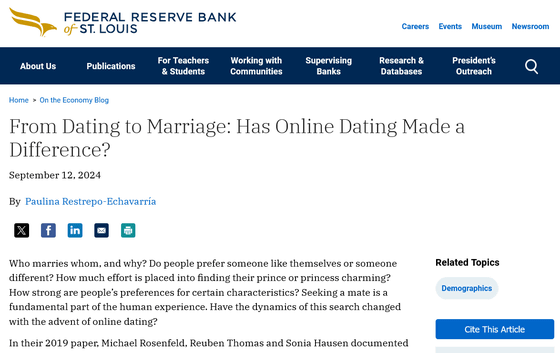Dating apps may be contributing to widening income inequality

A study using marriage data from 1960 to 2021 found that the spread of dating apps has led people to marry people who are closer to them, which may have contributed to the widening household inequality seen since the 1980s.
Marriage Market Sorting in the US- Working Papers - St. Louis Fed

Has Online Dating Made a Difference to Marriage Matches?

Online Dating Caused a Rise in US Income Inequality, Research Paper Shows - Bloomberg
https://www.bloomberg.com/news/articles/2024-09-14/online-dating-caused-a-rise-in-us-income-inequality-research-paper-shows
According to a Federal Reserve research team, the number of couples who met on a dating app and got married rose from just 2% in 1998 to 20% in 2008 and to almost half by 2017.
To see whether changes in dating have led to changes in marriage, the research team investigated questions such as 'What kind of people do people prefer?', 'How selective are people when looking for a partner?', 'Complementarity and substitutability of different attributes?', and 'To what extent is income inequality influenced by people's selectivity?'. The data were taken from the 2008-2021 Community Survey and the 1960 and 1980 Censuses.
In theory, dating apps would allow people to meet more people than just their real-life acquaintances, but the survey found that people preferred people with similar wages and education levels to themselves. News site Bloomberg points out that search filtering means high-income earners are more likely to marry other high-income earners.
The study found that marriages with the same educational background contributed 35% to the income gap, marriages with the same skill levels contributed 30%, marriages with the same income levels and marriages within the same age range contributed 15%, and marriages with the same race contributed 5%.
In addition, the data from 2008 to 2021 shows that men place slightly more importance on educational background and women place slightly more importance on age, while race has become less of a concern over the years.
Related Posts:
in Note, Posted by logc_nt







